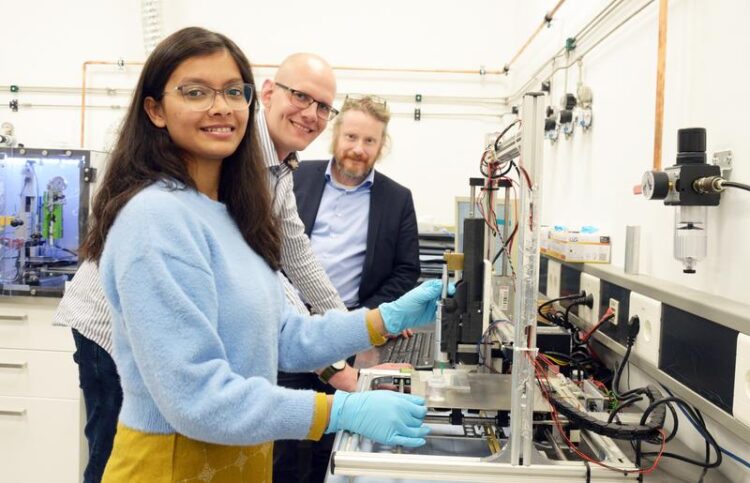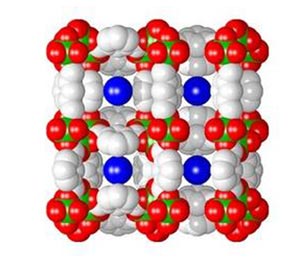New sensors for healthier indoor air

Barnika Chakraborty from India is doing a doctorate on new concepts in sensor technology with Professor Rainer Adelung (back) and Dr Leonard Siebert (middle) from Material Sciences at Kiel University.
Photo: Julia Siekmann, Uni Kiel
EU qualification programme brings together international doctoral researchers in chemistry, materials science and sensor technology.

© Dirk Lenzen
Air pollution is considered to be one of the world’s biggest environmental problems, but it is often only associated with outdoor air. Yet people spend an average of 22 hours a day indoors, where furniture, carpets or wall paints can release harmful solvents over time. The scientists in the international doctoral programme “SENNET” aim to detect such pollutants. They want to develop reliable sensors based on special, porous materials. Two of the twelve sub-projects are based at Kiel University, where inorganic chemistry and materials science work closely together on that. The main aim of the programme is to provide highly qualified training for doctoral researchers. It is funded by the European union with a total of about 3.2 million euros under the Marie Skłodowska-Curie Actions, about half a million euros will go to Kiel University. Eight universities are involved as well as research institutions and companies as partners. The programme has now officially started with a joint kick-off meeting on 11 and 12 May at the Technical University of Dublin in Ireland.
Using porous materials as filters
Most of the hazardous substances in indoor air are so-called volatile organic compounds (VOCs). They can cause damage to health, but are difficult to detect. Currently available miniature sensors (e.g. metal oxide semiconductor sensors) typically cannot distinguish a VOC of interest from, for instance, an air freshener. In order to detect pollutants specifically and reliably, the SENNET programme relies on porous materials, such as so-called metal-organic frameworks (MOFs) and zeolites. Their cavities can only hold certain molecules. “In a way, this works according to the lock-and-key principle and can be used like a kind of filter for selective measurements to reliably detect certain substances,” says Norbert Stock, Professor of Inorganic Chemistry at CAU and international MOF expert, explaining the scientific approach of the entire programme.
In his sub-project in the CAU’s Inorganic Chemistry, Stock wants to produce MOFs on highly sensitive metal oxide structures. To do so, he is working closely with Professor Rainer Adelung and Dr Leonard Siebert from the Functional Nanomaterials group. The material scientists have investigated and developed these nanostructures for a long time. Having also a long-time-experience in fabricating sensors via 3D printing, they will create complex sensors for detecting multiple pollutants in the second sub-project at Kiel University. “High-performance sensors must above all be sensitive, selective and stable. This means that they must be able to reliably detect even small amounts of the substance over time,” says co-subproject leader Dr Leonard Siebert. “With our materials and 3D printing techniques, we hope to improve several factors at once.”
Qualifying talented young people for different career paths
The EU project brings together expertise from chemistry, physics, materials science and sensor technology and is open to participants from all over the world. The programme includes stays of several months at another partner university as well as in a company and joint conferences of the whole network. In this way, the doctoral researchers will get to know the entire value chain of sensor development and establish international contacts. At the end, they receive a joint degree from their two partner universities.
“The focus of the programme is to attract talented young researchers from all over the world and to further qualify them for various career options. At the same time, it strengthens international cooperation and networking between basic and applied research as well as industry,” says sub-project leader Adelung, emphasising the advantages for doctoral researchers, universities and companies in the region.
Wissenschaftliche Ansprechpartner:
Prof. Dr. Norbert Stock
Inorganic Chemistry
Phone: +49 431 880-1675
E-Mail: stock@ac.uni-kiel.de
https://www.ac.uni-kiel.de/de/stock
Prof. Dr. Rainer Adelung
Functional Nanomaterials
Telefon: +49 431 880-6116
E-Mail: ra@tf.uni-kiel.de
https://www.tf.uni-kiel.de/matwis/fnano/de
Dr.-Ing. Leonard Siebert
Functional Nanomaterials
Phone: +49 431 880-6181
E-Mail: lesi@tf.uni-kiel.de
https://www.tf.uni-kiel.de/matwis/fnano/de
Weitere Informationen:
https://www.uni-kiel.de/en/details/news/124-sennet more about the projects from Kiel
https://sennet-project.eu/ Project Website SENNET
http://www.kinsis.uni-kiel.de/en Website KiNSIS (Kiel Nano, Surface and Interface Science), one of the priority research areas at Kiel University
Media Contact
All latest news from the category: Materials Sciences
Materials management deals with the research, development, manufacturing and processing of raw and industrial materials. Key aspects here are biological and medical issues, which play an increasingly important role in this field.
innovations-report offers in-depth articles related to the development and application of materials and the structure and properties of new materials.
Newest articles

Compact LCOS Microdisplay with Fast CMOS Backplane
…for High-Speed Light Modulation. Researchers from the Fraunhofer Institute for Photonic Microsystems IPMS, in collaboration with HOLOEYE Photonics AG, have developed a compact LCOS microdisplay with high refresh rates that…

New perspectives for material detection
CRC MARIE enters third funding period: A major success for terahertz research: Scientists at the University of Duisburg-Essen and the Ruhr University Bochum have been researching mobile material detection since…

CD Laboratory at TU Graz Researches New Semiconductor Materials
Using energy- and resource-saving methods, a research team at the Institute of Inorganic Chemistry at TU Graz aims to produce high-quality doped silicon layers for the electronics and solar industries….



